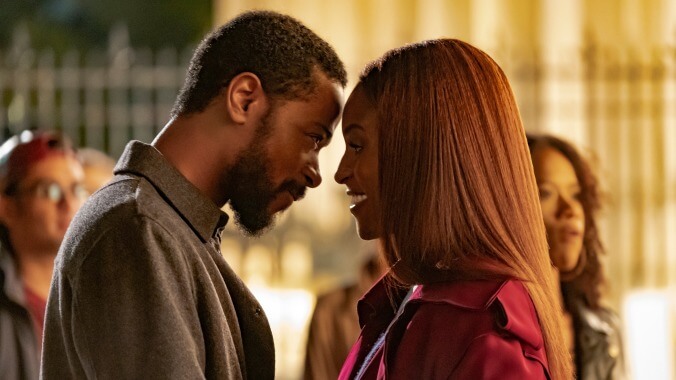The Photograph only occasionally snaps into focus


Nostalgia for the glossily cozy rom-coms of the 1990s is a major driving force behind the romantic comedy revival that’s come to dominate movie theaters and streaming services in the past few years. For her own addition to this canon, writer/director Stella Meghie (The Weekend, Everything, Everything) takes inspiration from an adjacent trend: the ’90s boom of romantic dramedies starring all-black casts. Films like Love Jones, The Best Man, and Love & Basketball explored love and life from the perspective of modern black professionals, and are too often segmented from wider conversations about the rom-com genre. Meghie lovingly evokes that era by casting Issa Rae and Lakeith Stanfield as two thoughtful love birds dealing with ambition, insecurity, and matters of the heart. Occasionally, however, her mix of familial melodrama and lush romance feels more like a low-key riff on the formulaic works of Nicholas Sparks.
Like many of Sparks’ tales, The Photograph takes place across dual timelines. In the present, New York-based museum curator Mae Morton (Rae) is mourning the unexpected death of her talented yet distant photographer mother, Christina Eames. Christina hid her cancer diagnosis from her daughter but left behind a long letter explaining herself by detailing a formative love affair from her youth. In the flashback storyline, we see a young Christina (Chante Adams) and her fisherman boyfriend Isaac Jefferson (Insecure’s Y’lan Noel) navigate the tension between love and professional ambition in 1980s Louisiana. Meanwhile, back in the present, journalist Michael Block (Stanfield) develops an interest in Christina’s work that leads him to a romantic connection with Mae. Their instant attraction forces both to contend with what they want from life.
Meghie is interested in the way that the patterns set by our parents can become templates for our own lives. Unfortunately, the bifurcated structure is a hindrance to both romances, as neither is allowed the breathing room it needs to fully spring to life. The meandering plot is overflowing with themes and ideas—particularly about career-driven women—but it lacks the follow-through to weave them all together. The 1980s stuff is awash with clichés and thinly drawn characters. The present day throughline fares a bit better because Rae and Stanfield have an easy chemistry together and the film surrounds them with charismatic supporting players including Courtney B. Vance, Lil Rel Howery, Chelsea Peretti, Hamilton’s Jasmine Cephas Jones, Waves’ Kelvin Harrison Jr., and Chi-Raq’s Teyonah Parris. Yet Meghie expects big buy-ins from viewers in terms of rooting for relationships that are barely fleshed onscreen.
The friction between Christina and her mom is conveyed solely via clunky exposition, while Mae and Michael’s romantic bond escalates so quickly it feels like the film accidentally skipped a few scenes. The Photograph is content to chug along a preordained rom-dram track, where even the one big surprise is heavily telegraphed from the beginning. It wouldn’t be incorrect to describe it as “comfort food,” although that makes it sound a little cheesier than it is. There’s an appreciable poise to The Photograph, which is reflected in the gorgeous lighting by cinematographer Mark Schwartzbard and a moody jazz score from pianist Robert Glasper. (Al Green and Luther Vandross also feature prominently on the soundtrack.) Even when it stumbles, The Photograph remains consistently pleasant to watch, particularly when Meghie moves away from dramatic plotting and just lets Rae, Stanfield, Howery, and Parris riff on a wedding sartorial choice gone wrong. There’s something to be said for the simple joys of watching beautiful, wealthy, endearingly awkward people fall in love against backdrops that include a tucked away bar in New Orleans and a dramatic hurricane in New York City.
Yet the biggest reason to recommend The Photograph is one of its smallest players. As the present-day version of Isaac—who functions as a sort of fairy godfather figure for the two lovers—Rob Morgan turns in a characteristically fantastic supporting performances like the ones he’s delivered in everything from Dee Rees’ Mudbound to Joe Talbot’s The Last Black Man In San Francisco to the Marvel Netflix Defenders universe. Isaac’s quiet regret at not having had the courage to follow his heart provides a sense of emotional stakes that’s lacking elsewhere. Across just a handful of scenes, Morgan emerges as the soul of the film. It’s a testament to how much the right actor can do with even the briefest screentime—and a call to give Morgan a starring role worthy of him.